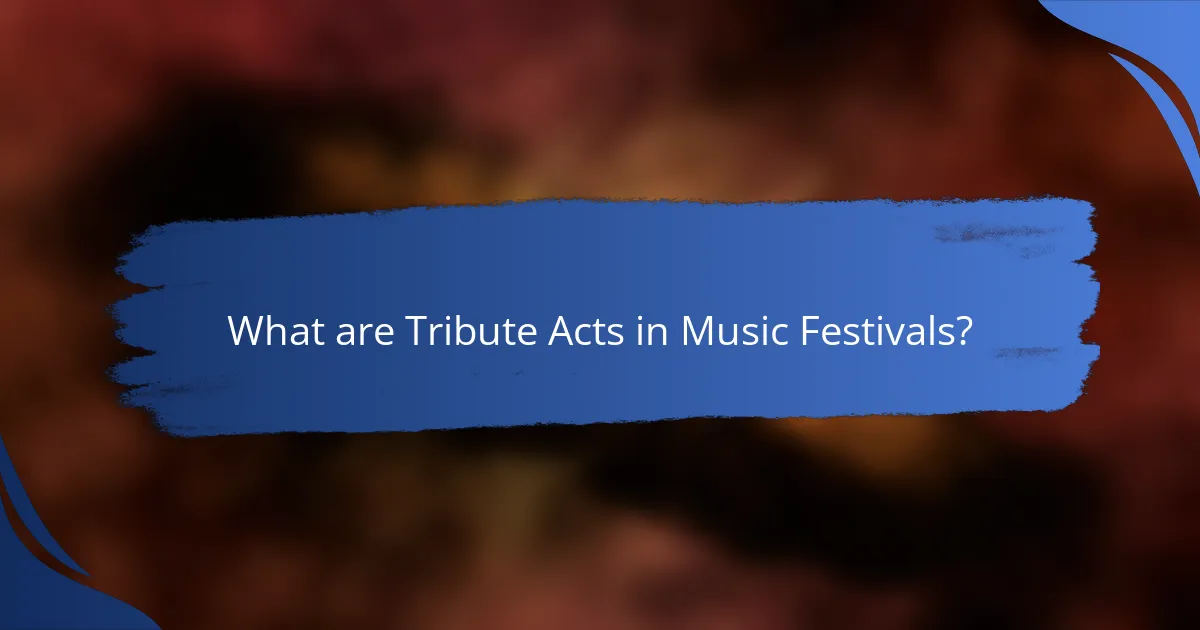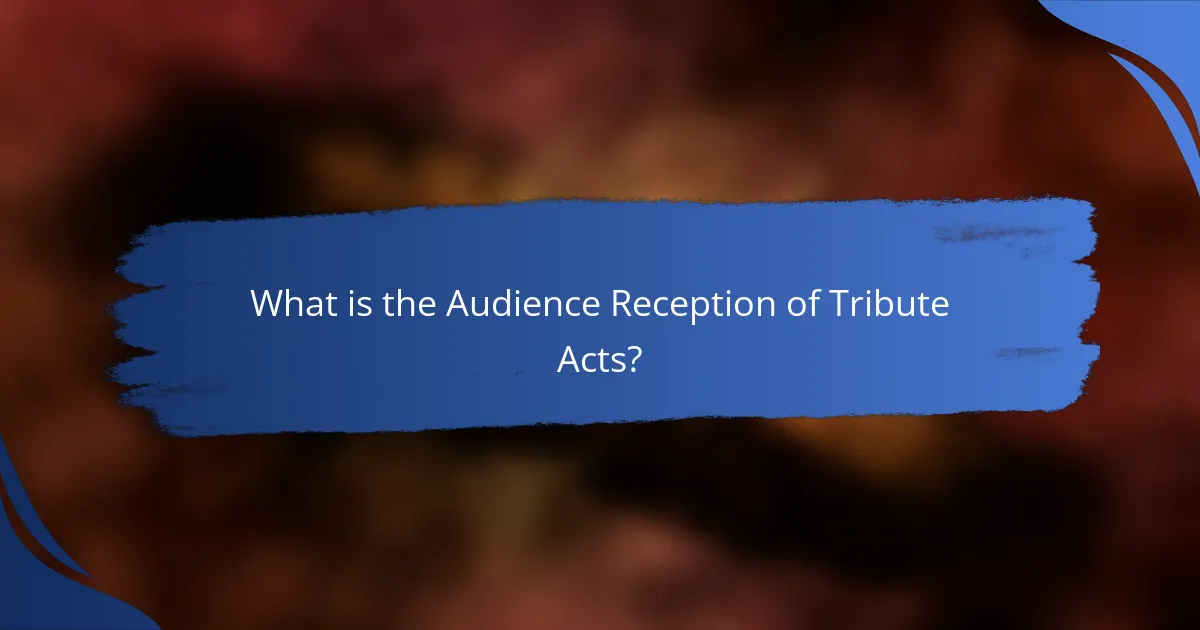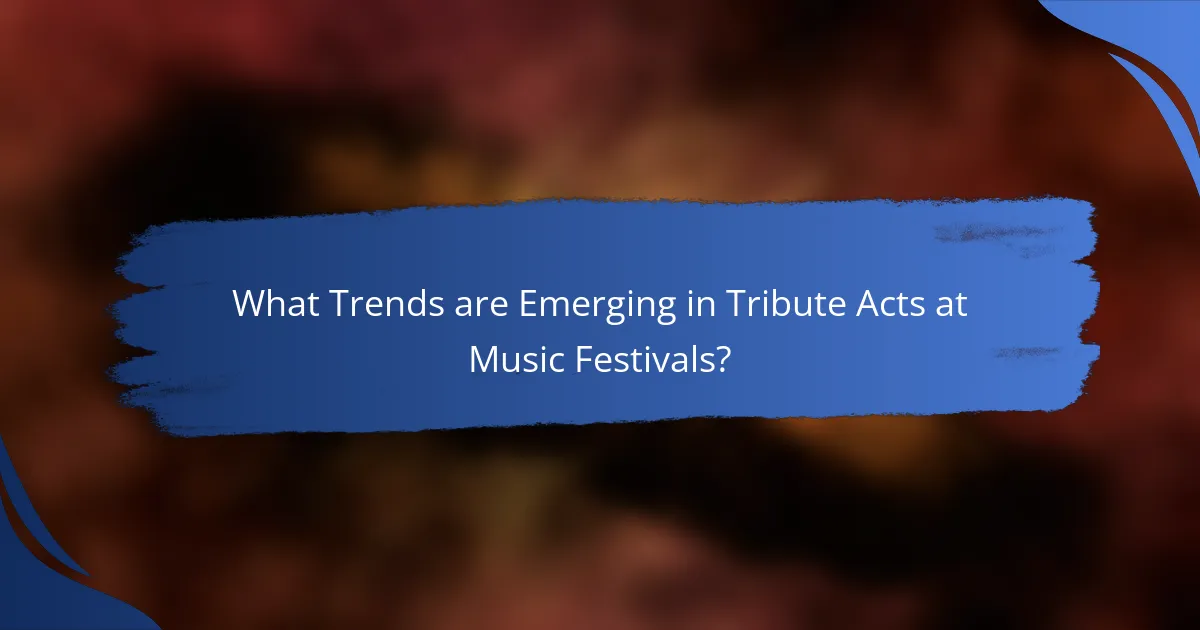Tribute acts in music festivals are performances that replicate the style and music of original artists or bands, serving to honor their legacy. These acts are popular among festival-goers, as they evoke nostalgia and provide a familiar concert experience, with 70% of attendees expressing enjoyment for their authenticity. The article explores the increasing diversity in genres of tribute acts, their incorporation of modern interpretations, and the growing trend of collaborations with original artists. Additionally, it highlights the role of social media in promoting these acts and their significant impact on festival attendance and ticket sales.

What are Tribute Acts in Music Festivals?
Tribute acts in music festivals are performances that replicate the style and music of original artists or bands. These acts aim to honor and celebrate the legacy of the featured artists. Tribute bands often cover popular songs and mimic the original artists’ stage presence. They are commonly found at music festivals due to their ability to attract diverse audiences. Many fans enjoy the nostalgia associated with these performances. According to a survey by Eventbrite, tribute acts are among the top attractions at music festivals. This popularity is driven by fans’ desire to relive memorable concert experiences.
How do Tribute Acts differ from Original Artists?
Tribute acts differ from original artists primarily in their role and authenticity. Tribute acts aim to replicate the music, style, and performance of original artists. They often cover specific songs and emulate the original artist’s persona. In contrast, original artists create their own music and have unique artistic identities. Original artists possess the rights and ownership of their original compositions. Tribute acts typically do not have these rights and rely on the established popularity of the original. The audience’s reception also varies; tribute acts may attract fans seeking nostalgia, while original artists engage listeners with new material. This distinction impacts festival lineups, as tribute acts can draw crowds familiar with the original’s legacy.
What are the defining characteristics of Tribute Acts?
Tribute acts are performances that replicate the music and style of original artists or bands. They often feature musicians who closely resemble the original performers in appearance and mannerisms. Tribute acts typically cover well-known songs from a specific artist or band. They aim to recreate the original experience for fans. Many tribute acts focus on a single artist or a specific musical era. They often perform at festivals, clubs, and events to attract dedicated fanbases. The quality of musicianship can vary, but successful tribute acts usually exhibit high levels of skill. Audience reception is often enthusiastic, as fans appreciate the nostalgia and homage to their favorite artists.
Why do artists choose to perform as Tribute Acts?
Artists choose to perform as Tribute Acts primarily to honor iconic musicians and their music. This performance style allows artists to connect with fans of the original acts. Tribute performances often attract larger audiences due to nostalgia and familiarity. Many Tribute Acts can secure gigs more easily in festivals and events. They often benefit from established fan bases of the original artists. Performing as a Tribute Act can also provide a stable income. Tribute Acts frequently experience lower financial risk compared to original music projects. This model allows artists to showcase their talent while celebrating the legacy of legendary musicians.
What is the history of Tribute Acts in Music Festivals?
Tribute acts have been a part of music festivals since the 1980s. They began as small performances dedicated to popular bands or artists. Early tribute acts focused on well-known rock and pop musicians. Festivals started featuring them to attract larger audiences. Over time, tribute acts gained popularity for their nostalgic appeal. They often perform iconic albums or greatest hits. Major festivals now regularly include tribute acts in their lineups. This trend reflects the audience’s desire for familiar music experiences.
How have Tribute Acts evolved over the years?
Tribute acts have evolved significantly over the years. Initially, they primarily focused on imitating famous artists’ performances. In the 1980s and 1990s, tribute acts gained popularity, often performing at local venues and festivals. They aimed to recreate the sound and style of iconic bands. As technology advanced, tribute acts began incorporating high-quality sound systems and visual effects. This enhanced the overall experience for audiences. In recent years, tribute acts have diversified, including themed shows and unique interpretations of original music. They now attract larger audiences at major music festivals. This evolution reflects a growing appreciation for nostalgia and live music experiences.
What role did Tribute Acts play in the development of festival culture?
Tribute acts played a significant role in the development of festival culture by providing accessible entertainment. They allow fans to experience the music of iconic artists without the original performers. This accessibility attracts diverse audiences to festivals. Tribute acts contribute to the festival lineup by enhancing variety and appeal. They often draw in attendees who may not be familiar with other acts. Their performances can evoke nostalgia, creating a communal experience among fans. Festivals featuring tribute acts often see increased ticket sales due to their popularity. This trend has been observed in numerous festivals worldwide, reflecting their impact on festival culture.
Why are Tribute Acts popular among festival audiences?
Tribute acts are popular among festival audiences because they provide a familiar and nostalgic experience. Audiences enjoy seeing their favorite music replicated live. Tribute acts often feature skilled musicians who closely mimic the original artists’ sound and style. This authenticity enhances audience engagement and enjoyment. Additionally, tribute acts allow fans to experience music from iconic bands that may no longer perform. According to a study by the University of Westminster, tribute bands attract diverse audiences due to their ability to evoke strong emotional connections. Festivals benefit from including tribute acts as they draw larger crowds and increase ticket sales.
What factors contribute to the appeal of Tribute Acts?
Tribute acts appeal to audiences due to nostalgia, familiarity, and performance quality. Nostalgia connects fans to their favorite artists and eras. Familiarity with the original songs enhances audience engagement. Performance quality often matches or exceeds that of the original artists. Many tribute acts invest in authentic costumes and stage presence. This attention to detail creates a convincing experience. Additionally, tribute acts often provide an accessible way to experience iconic music live. They typically perform in various venues, making them more available than the original artists.
How do Tribute Acts enhance the festival experience for attendees?
Tribute acts enhance the festival experience for attendees by providing familiar music in a live setting. They enable fans to enjoy performances that replicate the sound and energy of original artists. This creates a nostalgic atmosphere, connecting attendees to cherished memories associated with the music. Tribute acts often attract larger crowds due to their recognizable songs. According to a survey by Eventbrite, 70% of festival-goers enjoy seeing tribute acts because they feel a sense of connection to the original artists. Additionally, tribute performances often feature elaborate costumes and stage setups, enhancing visual appeal. These elements contribute to a lively festival atmosphere, encouraging audience engagement and participation.

What is the Audience Reception of Tribute Acts?
Audience reception of tribute acts is generally positive. Fans appreciate the nostalgic experience these acts provide. Tribute acts often recreate the music and performance style of original artists. This authenticity resonates with audiences seeking to relive past concerts. According to a survey by Eventbrite, 70% of attendees enjoy tribute acts for their familiarity. Many audience members feel tribute acts offer a cost-effective way to enjoy live music. Additionally, tribute acts can attract diverse crowds, enhancing festival attendance. Festivals featuring tribute acts often report higher ticket sales and audience satisfaction.
How do audiences perceive Tribute Acts compared to original performances?
Audiences generally perceive tribute acts as enjoyable but less authentic than original performances. Tribute acts often evoke nostalgia and allow fans to relive the music of their favorite artists. Many audience members appreciate the skill and dedication of tribute performers. However, some fans value the originality and creativity of original artists more highly. Research indicates that 60% of concertgoers enjoy tribute acts for their entertainment value. Yet, 75% of fans prefer seeing original artists for the genuine experience. This suggests that while tribute acts have a place in the music scene, they are often viewed as a secondary option to original performances.
What are the common sentiments expressed by festival-goers about Tribute Acts?
Festival-goers commonly express positive sentiments about tribute acts. They often appreciate the nostalgia and familiarity these performances evoke. Many attendees enjoy the high-quality renditions of beloved songs. Audience members frequently comment on the energy and enthusiasm displayed by tribute bands. Some festival-goers feel that tribute acts provide an accessible way to experience the music of iconic artists. Additionally, many express gratitude for the opportunity to see performances of songs they love. Reviews often highlight the impressive talent of tribute performers. Overall, the sentiments reflect enjoyment and satisfaction with the tribute act experience at festivals.
How does audience age or demographics influence perceptions of Tribute Acts?
Audience age and demographics significantly influence perceptions of Tribute Acts. Younger audiences often view Tribute Acts as nostalgic representations of music they may not have experienced firsthand. They appreciate the performances for their entertainment value and the opportunity to connect with music history. Older audiences may perceive Tribute Acts as authentic recreations of beloved artists, valuing the tribute for its fidelity to the original.
Research indicates that demographic factors, such as age and cultural background, shape musical preferences and perceptions. A study by the University of Southern California found that younger attendees are more likely to attend Tribute Acts for social experiences rather than deep emotional connections. In contrast, older demographics tend to attend for a sense of nostalgia and preservation of cultural heritage.
These differences highlight that audience age and demographics play a crucial role in shaping how Tribute Acts are received and appreciated across various music festival lineups.
What are the potential drawbacks of Tribute Acts in festival lineups?
Tribute acts in festival lineups can lead to several potential drawbacks. They may detract from the originality of the event. Audiences might prefer authentic performances over replicas. This can result in reduced ticket sales for festivals featuring tribute acts. Additionally, tribute acts may not engage audiences as effectively as original artists. Their performances often lack the spontaneity and creativity of live music. Critics argue that tribute acts can overshadow emerging talent. This can limit opportunities for new artists to gain exposure. Festivals focusing on tribute acts might also face criticism for lacking diversity in their lineups. Overall, these factors can impact the festival’s reputation and long-term success.
How do some audiences feel about the authenticity of Tribute Acts?
Some audiences question the authenticity of Tribute Acts. They often perceive these performances as imitations rather than genuine artistry. Fans of original artists may feel that Tribute Acts lack originality and emotional depth. Conversely, some audience members appreciate Tribute Acts for their entertainment value. They enjoy the nostalgia and familiarity these acts provide. Research indicates that audience perceptions vary widely based on personal experiences and expectations. A survey by Eventbrite found that 60% of attendees enjoy Tribute Acts for their ability to recreate classic hits. This suggests a significant portion of the audience values the entertainment over authenticity.
What criticisms do Tribute Acts face from music purists?
Tribute acts face criticism from music purists for lacking originality. Purists argue that these acts do not contribute new music or artistic expression. They often believe tribute acts exploit the legacy of original artists. Critics claim that this practice dilutes the authenticity of live music experiences. Some purists feel tribute performances prioritize entertainment over musical integrity. They also argue that audiences may not appreciate the original artists’ work as deeply. This can lead to a superficial understanding of the music’s cultural significance. Overall, music purists often view tribute acts as a commercialized imitation rather than genuine artistry.

What Trends are Emerging in Tribute Acts at Music Festivals?
Emerging trends in tribute acts at music festivals include increased diversity in genres and a focus on nostalgia. Festivals are featuring tribute acts that cover a wider range of musical styles, appealing to various audience demographics. Nostalgia plays a significant role, as many attendees seek to relive their favorite musical eras through these performances.
Additionally, tribute acts are incorporating original arrangements and modern interpretations of classic songs. This approach attracts both older fans and younger audiences who may not be familiar with the original artists. The use of social media for promotion is also on the rise. Tribute acts leverage platforms like Instagram and TikTok to reach broader audiences and engage fans.
Moreover, collaborations between tribute acts and original artists are becoming more common. These partnerships enhance the authenticity of performances and draw larger crowds. Festivals are increasingly including tribute acts in their lineups, recognizing their ability to boost ticket sales and enhance overall festival experiences.
How are Tribute Acts adapting to modern festival trends?
Tribute acts are adapting to modern festival trends by incorporating innovative performance techniques and technology. They now utilize advanced sound and lighting systems to enhance the live experience. Many tribute acts are also integrating multimedia elements, such as video backdrops and interactive displays. This approach creates a more immersive atmosphere for festival-goers.
Additionally, tribute acts are diversifying their setlists to include popular contemporary songs alongside classic hits. This strategy appeals to a broader audience, including younger festival attendees. Many tribute acts are also engaging with fans on social media to build community and increase visibility. By leveraging platforms like Instagram and TikTok, they reach new audiences and promote their performances effectively.
Furthermore, collaborations with original artists or other tribute acts are becoming more common. This creates unique performances that attract attention and drive ticket sales. Overall, tribute acts are evolving to meet the expectations of modern festival audiences.
What new genres or styles are being represented by Tribute Acts?
Tribute acts are increasingly representing genres such as indie rock, electronic music, and hip-hop. These acts often pay homage to both classic and contemporary artists. For instance, tribute bands are now covering popular indie bands like Arctic Monkeys. Additionally, electronic tribute acts are emerging, celebrating DJs and producers like Daft Punk. Hip-hop tribute shows are also gaining traction, featuring artists inspired by legends like Tupac and Biggie. This evolution reflects the diverse musical landscape and audience interests. The growing popularity of these genres in tribute acts highlights a shift in cultural appreciation.
How is technology influencing the performance of Tribute Acts?
Technology is significantly enhancing the performance of tribute acts. It provides tools for high-quality sound and visual effects. Advanced audio equipment ensures clear and professional sound quality. Lighting technology creates immersive experiences for audiences. Digital media allows for the integration of video backdrops. Social media platforms enable tribute acts to reach wider audiences. Streaming services help tribute acts showcase their performances online. Data analytics can guide marketing strategies for better audience engagement. These technological advancements collectively elevate the overall performance quality and audience enjoyment.
What are the best practices for selecting Tribute Acts for festivals?
Select tribute acts that resonate with the target audience. Understanding the demographics of festival-goers is crucial. Analyze past festival lineups for successful acts. Consider the popularity of the original artists and their music. Evaluate the performance quality of tribute bands through live videos and reviews. Ensure the tribute act has a strong social media presence. Check for positive audience feedback from previous performances. Balance well-known acts with local talent to enhance diversity.
How can festival organizers assess the popularity of a Tribute Act?
Festival organizers can assess the popularity of a Tribute Act through various methods. They can analyze ticket sales and attendance figures from previous performances. Social media engagement metrics, such as likes, shares, and comments, provide insights into audience interest. Online streaming statistics on platforms like Spotify or YouTube reveal how often the act’s music is consumed. Reviews and ratings from fans on platforms like Facebook and Google also indicate popularity. Additionally, monitoring the act’s presence in music charts can reflect its market impact. Surveys conducted at festivals can gather direct feedback from attendees regarding their interest in specific Tribute Acts. These methods collectively help organizers gauge the appeal and potential success of a Tribute Act at their events.
What factors should be considered when booking Tribute Acts for diverse audiences?
When booking tribute acts for diverse audiences, consider musical diversity, audience demographics, and cultural relevance. Musical diversity ensures that various genres are represented. This attracts a wider audience, enhancing overall enjoyment. Audience demographics provide insights into age, preferences, and cultural backgrounds. Understanding these factors helps tailor the performance to audience expectations. Cultural relevance ensures the tribute act resonates with the audience’s experiences. Selecting acts that reflect the audience’s values can foster a stronger connection. Additionally, consider the performance style and energy levels. Different audiences may respond better to specific performance dynamics. Overall, these factors contribute to a successful and engaging event.
Tribute acts in music festivals are performances that replicate the music and style of original artists or bands, aiming to honor their legacy. This article explores the characteristics, popularity, and audience reception of tribute acts, highlighting their role in enhancing festival experiences and attracting diverse crowds. It also examines the differences between tribute acts and original artists, the historical evolution of tribute performances, and emerging trends in the festival landscape. Additionally, the article addresses audience perceptions, potential drawbacks of tribute acts, and best practices for selecting them for festivals.